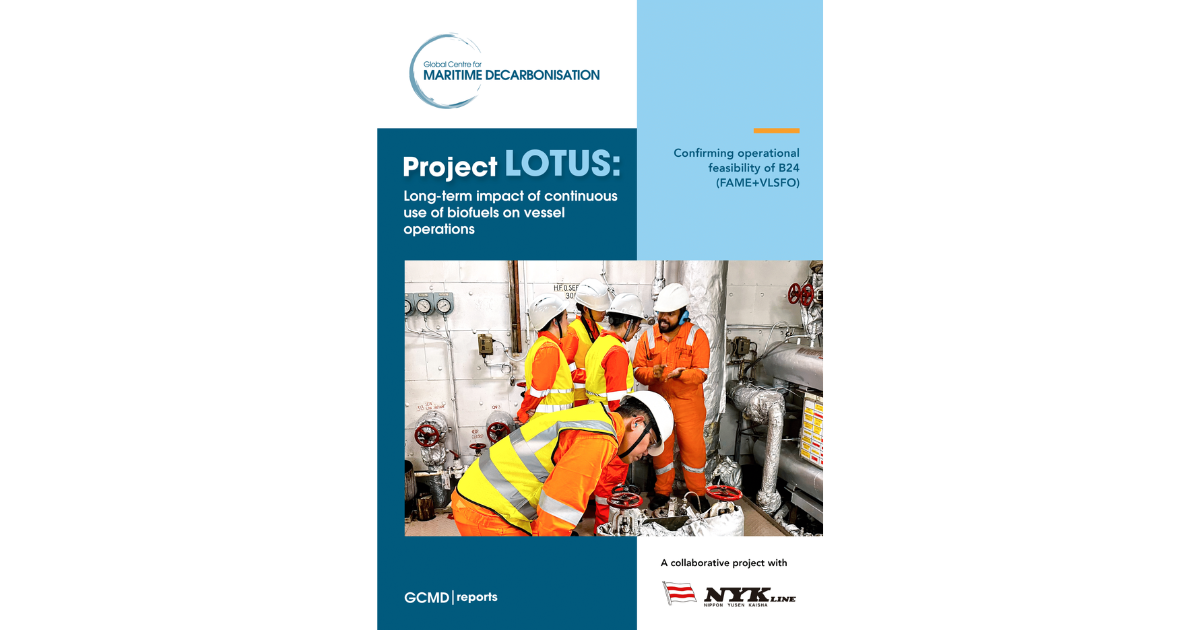
GCMD’s Project LOTUS confirms long-term operational feasibility of B24 biofuel blend in vessels
SINGAPORE: The Global Centre for Maritime Decarbonisation (GCMD) today released its Project LOTUS (Long-term impact of continuous use of biofuels on vessel operations) report.
Launched in partnership with NYK Line on 9 May 2024, the six-month trial onboard a pure car and truck carrier (PCTC) assessed the impact of continuous use of a B24 blend, comprising 24% fatty acid methyl ester (FAME; also known as biodiesel) with very low sulphur fuel oil (VLSFO), on engine performance and operations of the fuel oil delivery systems.
Closing the gap in long-term biodiesel operational data
Until now, the impacts of long-term use of biodiesel on main and generator engines, fuel storage and supply systems, and other shipboard components have not been comprehensively evaluated. Additionally, operational protocols for fuel conditioning, onboard storage, and comprehensive inspection checklists remain limited.
Project LOTUS addresses this gap directly by implementing a structured monitoring approach to track fuel and lubricant quality at key sampling points across these systems, and inspect engine and fuel system components throughout the trial.
This work is especially pertinent following the International Maritime Organization (IMO)’s approval of its net-zero framework, positioning biofuels as an increasingly valuable near-term decarbonisation measure. Shipowners can increase the biofuel content of their blends to reduce penalties under escalating Greenhouse Gas (GHG) Fuel Intensity (GFI) targets, meet compliance requirements, or generate “surplus units” for trading or future use.
Extensive testing under actual operating conditions
Project LOTUS involved extensive laboratory testing of 94 fuel and 91 lubricating oil samples, alongside detailed engine inspections and measurements during the vessel’s scheduled post-trial dry dock.
The main and generator engines, which ran on B24 for 2,888 and 1,813 hours, respectively, performed comparably to when they operated on VLSFO.
Key observations confirmed no excessive sludge in fuel injection valves, no scratches in fuel injection pump plungers, and no liner or piston wear beyond original equipment manufacturer (OEM) specifications. Scavenge drain and engine oil analyses also showed no excessive wear elements.
While the acid value of B24 blends increased 2.5-fold after six months of storage, the fuel quality remained within ISO 8217 specifications. No microbial growth was observed in fuel samples.
With these findings, OEMs confirmed engine and hardware compatibility with long-term B24 use, with no significant impact on operational costs, provided appropriate maintenance and handling practices are followed.
Actual operational practices with biodiesel
To complement the pilot, GCMD surveyed other vessel operators using biodiesel to compare their onboard practices with guidelines issued by marine classification societies and OEMs.
The interviews indicate that while OEMs and classification societies take an abundance-of-caution stance, the surveyed vessel operators have adopted a more pragmatic, risk-based strategy to adopting biodiesel blends by adapting existing standard operating procedures (SOPs) for VLSFO with recommended technical guidance where practicable. This suggests that when operators carry out appropriate operations in line with such guidance, biodiesel use does not present major issues.
As biofuels adoption becomes increasingly pervasive, ship operators, OEMs, and classification societies will need to align on how and to what extent technical guidance should be applied to balance robust safety standards with operational realities.
A framework to support shipboard biodiesel monitoring
A key outcome of Project LOTUS is the development of a structured monitoring framework designed around operational considerations for biodiesel use to systematically track equipment performance and identify anomalies arising from biodiesel operations.
A data log template was created based on an existing engine log and tailored to address the project’s specific needs. Now that this template has been successfully piloted, it is publicly available and can be further customised to accommodate different vessel setups
Professor Lynn Loo, CEO of GCMD, said, “Project LOTUS grounds the conversation around the extended use of biofuels in evidence. Our findings show that they can be deployed safely and reliably, providing a concrete pathway for shipping’s decarbonisation”.
Nobuhiro Kashima, Senior Managing Executive Office of NYK Line, said, “The use of biofuels is one of the key options for advancing the sustainable development of the maritime industry. We hope that the outcomes of this project will offer new possibilities to those considering the adoption of biofuels and help accelerate their broader use in various fields. By sharing the value of decarbonisation and logistics across society, we aim to help shape the next generation of shipping together.”
To access the report, please click here.

